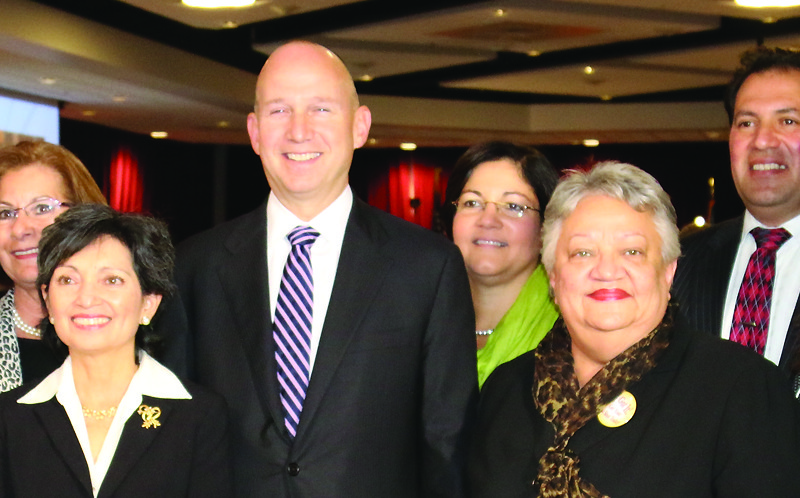Christiana Care leaders help organize Delaware Latino Summit

Christiana Care Health System leaders played important roles in organizing and carrying out the first Delaware Latino Summit “Connecting for a Brighter Future,” sponsored by the Delaware Hispanic Commission Nov. 13 at Delaware Technical & Community College in Dover.
“We had full registration with 325 participants — enthusiastic people who were eager to share their ideas on how Delawareans can be healthier and how Latinos can contribute to Delaware at every level,” said Rosa M. Colon-Kolacko, Ph.D, MBA, senior vice president of Christiana Care Learning Institute and chief diversity officer.
As a member of the 15-person Delaware Hispanic Commission and chair the Health and Social Services subcommittee, Colon-Kolacko helped design the summit and greeted participants at the opening session. She explained that one purpose of the gathering was to celebrate all that’s positive for Delaware Hispanics and connect with leaders from public and private sectors.
Another goal was for participants to talk about unmet needs in workshops on health and social services, education, housing, transportation, economic development, community and social justice. As a result, workshop participants put forth a series of proposals to be part of a Delaware Hispanic Public Policy Agenda that will be submitted to the governor in the first quarter of 2015.
“We’ve asked people to think practically — what we could change within one year and three years to make life better,” said Colon-Kolacko.
More than a dozen Christiana Care health providers and technical leaders brought their ideas and expertise to the summit. Thomas J. Peters, administrative director of the Learning Institute, made a distinctive contribution by creating an online interface for the summit. Attendees used smartphones to participate in a mobile public forum sharing what they appreciate about the state and what they wanted to change. Jacqueline Ortiz, M.Phil, director of Cultural Competency and Language Services, said it was helpful to get a panoramic view of services available by sharing with people from around the state.
“I feel good about what Christiana Care is doing in terms of how many resources we’re devoting to the Hispanic community,” she said. “For one thing, Christiana Care is one of only two hospitals in Delaware with a formally constituted Language Services Department.”
At Christiana Care, 85 percent of the requests for language services are for Spanish, and total requests for in-person interpreters have grown from 24 encounters a month in the spring of 2012 to 1,600 a month in the fall of 2014. Christiana Care has more than 70 bilingual employees who have been trained as medical interpreters in 18 languages.
“We also train the staff to have the skills, resources and knowledge to interact with people with a variety of cultural needs,” said Ortiz.
Nora Katurakes, MSN, RN, OCN, manager of the Community Health Outreach & Education Department, attended the summit to be a part of the process of identifying important issues for the Latino community and to lend a hand in moving forward.
Katurakes has worked on outreach to the Hispanic community by helping to train more than 60 promotoras — promoters of health education — who educate people in neighborhoods. “Three of our promotoras are with us today to share what they do and connect with others,” Katurakes said.
Delaware Gov. Jack Markell attended to congratulate the participants for coordinating the inaugural event and to encourage important conversations that can move to action. U.S. Rep. John Carney participated through video, and Delaware Department of Health and Social Services Secretary Rita Landgraf presented data collected by her department that contrasted the health of Hispanics in the state with Delaware’s overall population.
What’s clear is that the average Latino does not fare as well as the average Delawarean on measures such as obesity, smoking, high blood pressure, depression and insurance coverage. In general, 82.7 percent of Delawareans say their health is good or better, but among Hispanics the number is 78.4 percent.
By the end of the summit, close to 50 workshop participants contributed ideas on health and social services, arriving at broad priorities, which include:
- Create a state level literacy education program for Latinos, which will improve their access to health care.
- Develop state-mandated cultural competency education requirements for all clinicians.
- Supply more language services for Spanish-speaking residents, enhancing their ability to communicate with family doctors and mental health providers. (A task force will research how state law can be modified to reimburse translation services.)
- Foster collaboration between health care systems and community-based programs to develop a coordinated model to implement health care programs in all three counties.
- Strengthen behavioral health services dealing with anxiety, addiction and depression while working to lessen the stigma of seeking help.
- Compile a list of members of the Hispanic community willing to serve on state and non-profit boards.
- Create a workforce strategy to increase the number of multicultural and bilingual health care providers.
Michael Rosenthal, M.D., chair of Family & Community Medicine at Christiana Care, said the workshop highlighted the importance of partnering with Hispanic patients to make them aware of services in the community that can help them.
“We need to focus on how our neighbors can get access to the care they need,” Rosenthal said.